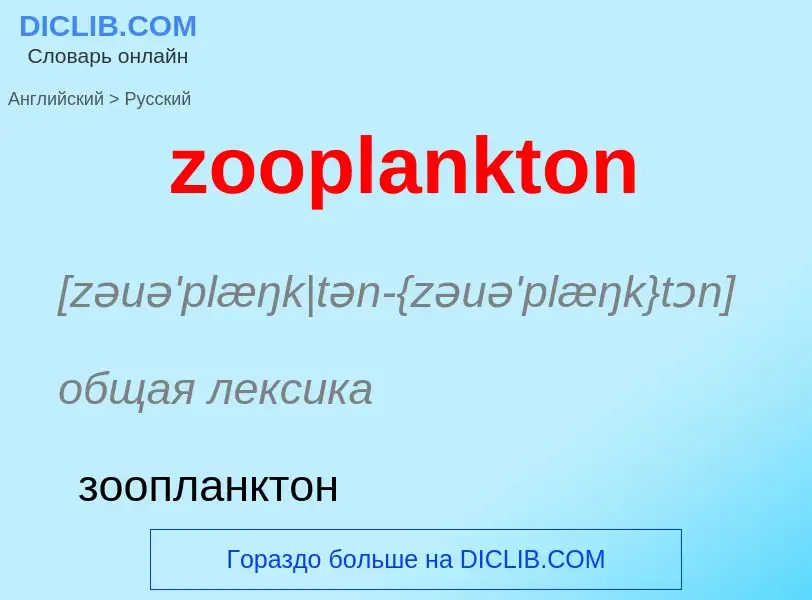Vertaling en analyse van woorden door kunstmatige intelligentie ChatGPT
Op deze pagina kunt u een gedetailleerde analyse krijgen van een woord of zin, geproduceerd met behulp van de beste kunstmatige intelligentietechnologie tot nu toe:
- hoe het woord wordt gebruikt
- gebruiksfrequentie
- het wordt vaker gebruikt in mondelinge of schriftelijke toespraken
- opties voor woordvertaling
- Gebruiksvoorbeelden (meerdere zinnen met vertaling)
- etymologie
zooplankton - vertaling naar russisch
[zəuə'plæŋk|tən-{zəuə'plæŋk}tɔn]
общая лексика
зоопланктон
существительное
зоология
зоопланктон
[zəuəplæŋk'tɔnik]
зоология
зоопланктонный
существительное
зоология
зоопланктонный
общая лексика
зоопланктер
Definitie
Wikipedia

Zooplankton are the animal component of the planktonic community ("zoo" comes from the Greek word for animal). Plankton are aquatic organisms that are unable to swim effectively against currents. Consequently, they drift or are carried along by currents in the ocean, or by currents in seas, lakes or rivers.
Zooplankton can be contrasted with phytoplankton, which are the plant component of the plankton community ("phyto" comes from the Greek word for plant). Zooplankton are heterotrophic (other-feeding), whereas phytoplankton are autotrophic (self-feeding). In other words, zooplankton cannot manufacture their own food. Rather, they must eat other plants or animals instead. In particular, they eat phytoplankton, which are generally smaller than zooplankton. Most zooplankton are microscopic but some (such as jellyfish) are macroscopic, meaning they can be seen with the naked eye.
Many protozoans (single-celled protists that prey on other microscopic life) are zooplankton, including zooflagellates, foraminiferans, radiolarians, some dinoflagellates and marine microanimals. Macroscopic zooplankton include pelagic cnidarians, ctenophores, molluscs, arthropods and tunicates, as well as planktonic arrow worms and bristle worms.
The distinction between plants and animals often breaks down in very small organisms. Recent studies of marine microplankton have indicated over half of microscopic plankton are mixotrophs. A mixotroph is an organism that can behave sometimes as though it were a plant and sometimes as though it were an animal, using a mix of autotrophy and heterotrophy. Many marine microzooplankton are mixotrophic, which means they could also be classified as phytoplankton.








![50px]] Material was copied from this source, which is available under a [https://creativecommons.org/licenses/by/4.0/ Creative Commons Attribution 4.0 International License].}} 50px]] Material was copied from this source, which is available under a [https://creativecommons.org/licenses/by/4.0/ Creative Commons Attribution 4.0 International License].}}](https://commons.wikimedia.org/wiki/Special:FilePath/Typical ocean models featuring zooplankton 2.jpg?width=200)

.jpg?width=200)
![However [[acantharian]] radiolarians have shells made from [[strontium sulfate]] crystals However [[acantharian]] radiolarians have shells made from [[strontium sulfate]] crystals](https://commons.wikimedia.org/wiki/Special:FilePath/Acantharian radiolarian Xiphacantha (Haeckel).jpg?width=200)


![Live ''[[Ammonia tepida]]'' streaming granular ectoplasm for catching food Live ''[[Ammonia tepida]]'' streaming granular ectoplasm for catching food](https://commons.wikimedia.org/wiki/Special:FilePath/Live Ammonia tepida.jpg?width=200)

![The [[Egyptian pyramid]]s were constructed from limestone that contained [[nummulite]]s.[http://www.ucl.ac.uk/GeolSci/micropal/foram.html#histofstudy Foraminifera: History of Study], [[University College London]]. Retrieved: 18 November 2019. The [[Egyptian pyramid]]s were constructed from limestone that contained [[nummulite]]s.[http://www.ucl.ac.uk/GeolSci/micropal/foram.html#histofstudy Foraminifera: History of Study], [[University College London]]. Retrieved: 18 November 2019.](https://commons.wikimedia.org/wiki/Special:FilePath/All Gizah Pyramids.jpg?width=200)

![Shell or test of a [[testate amoeba]], ''[[Arcella]]'' sp. Shell or test of a [[testate amoeba]], ''[[Arcella]]'' sp.](https://commons.wikimedia.org/wiki/Special:FilePath/Arcella sp.jpg?width=200)
![Stylonychia putrina]]'' Stylonychia putrina]]''](https://commons.wikimedia.org/wiki/Special:FilePath/Stylonychia putrina - 160x - II (13215594964).jpg?width=200)
.jpg?width=200)
![''[[Blepharisma japonicum]]'' ''[[Blepharisma japonicum]]''](https://commons.wikimedia.org/wiki/Special:FilePath/Mikrofoto.de-Blepharisma japonicum 15.jpg?width=200)
![This [[ciliate]] is digesting [[cyanobacteria]]. The mouth is at the bottom right. This [[ciliate]] is digesting [[cyanobacteria]]. The mouth is at the bottom right.](https://commons.wikimedia.org/wiki/Special:FilePath/The ciliate Frontonia sp.jpg?width=200)
![Gyrodinium]]'', one of the few naked dinoflagellates which lack armour Gyrodinium]]'', one of the few naked dinoflagellates which lack armour](https://commons.wikimedia.org/wiki/Special:FilePath/Gyrodinium dinoflagellate.jpg?width=200)

![[[Nassellarian]] radiolarians can be in symbiosis with dinoflagellates [[Nassellarian]] radiolarians can be in symbiosis with dinoflagellates](https://commons.wikimedia.org/wiki/Special:FilePath/Radiolarian - Podocyrtis (Lampterium) mitra Ehrenberg - 160x.jpg?width=200)
![''Tripos muelleri'']] is recognisable by its U-shaped horns ''Tripos muelleri'']] is recognisable by its U-shaped horns](https://commons.wikimedia.org/wiki/Special:FilePath/Ceratium tripos.jpg?width=200)
 (20299351186).jpg?width=200)

![[[Red tide]] [[Red tide]]](https://commons.wikimedia.org/wiki/Special:FilePath/Algal bloom(akasio) by Noctiluca in Nagasaki.jpg?width=200)
![[[Tintinnid]] ciliate ''Favella'' [[Tintinnid]] ciliate ''Favella''](https://commons.wikimedia.org/wiki/Special:FilePath/Tintinnid ciliate Favella.jpg?width=200)
![Euglena mutabilis]]'', a photosynthetic [[flagellate]] Euglena mutabilis]]'', a photosynthetic [[flagellate]]](https://commons.wikimedia.org/wiki/Special:FilePath/Euglena mutabilis - 400x - 1 (10388739803) (cropped).jpg?width=200)
![[[Zoochlorellae]] (green) living inside the [[ciliate]] ''Stichotricha secunda'' [[Zoochlorellae]] (green) living inside the [[ciliate]] ''Stichotricha secunda''](https://commons.wikimedia.org/wiki/Special:FilePath/Stichotricha secunda - 400x (14974779356).jpg?width=200)

![[[Copepod]] with eggs [[Copepod]] with eggs](https://commons.wikimedia.org/wiki/Special:FilePath/Copepod 2 with eggs.jpg?width=200)
![[[Segmented worm]] [[Segmented worm]]](https://commons.wikimedia.org/wiki/Special:FilePath/Tomopteriskils.jpg?width=200)
![[[Amphipod]] [[Amphipod]]](https://commons.wikimedia.org/wiki/Special:FilePath/Hyperia.jpg?width=200)
![[[Krill]] [[Krill]]](https://commons.wikimedia.org/wiki/Special:FilePath/Krill666.jpg?width=200)
![Blue ocean slug]] Blue ocean slug]]](https://commons.wikimedia.org/wiki/Special:FilePath/Glaucus atlanticus 1 cropped.jpg?width=200)
![Juvenile planktonic [[squid]] Juvenile planktonic [[squid]]](https://commons.wikimedia.org/wiki/Special:FilePath/Squidu.jpg?width=200)
![[[Ocean sunfish]] larvae (2.7mm) [[Ocean sunfish]] larvae (2.7mm)](https://commons.wikimedia.org/wiki/Special:FilePath/Molalavdj.jpg?width=200)
![[[Boxfish]] larva [[Boxfish]] larva](https://commons.wikimedia.org/wiki/Special:FilePath/FMIB 47039 Ostracion hoops.jpeg?width=200)
![[[Jellyfish]] [[Jellyfish]]](https://commons.wikimedia.org/wiki/Special:FilePath/Parumbrosa polylobata 01.jpg?width=200)
![[[Bioluminescent]] [[ctenophore]] (comb jelly) [[Bioluminescent]] [[ctenophore]] (comb jelly)](https://commons.wikimedia.org/wiki/Special:FilePath/Ctenophora-Comb-jelly-Euplokamis-sp.-02.jpg?width=200)
![This free-floating [[pyrosome]] is made up of hundreds of individual [[bioluminescent]] tunicates This free-floating [[pyrosome]] is made up of hundreds of individual [[bioluminescent]] tunicates](https://commons.wikimedia.org/wiki/Special:FilePath/Tunicate off Atauro island.jpg?width=200)
![[[Salp]] chain [[Salp]] chain](https://commons.wikimedia.org/wiki/Special:FilePath/23 salpchain frierson odfw (8253212250).jpg?width=200)
![50px]] Material was copied from this source, which is available under a [https://creativecommons.org/licenses/by/4.0/ Creative Commons Attribution 4.0 International License]. 50px]] Material was copied from this source, which is available under a [https://creativecommons.org/licenses/by/4.0/ Creative Commons Attribution 4.0 International License].](https://commons.wikimedia.org/wiki/Special:FilePath/Export Processes in the Ocean from Remote Sensing.jpg?width=200)
